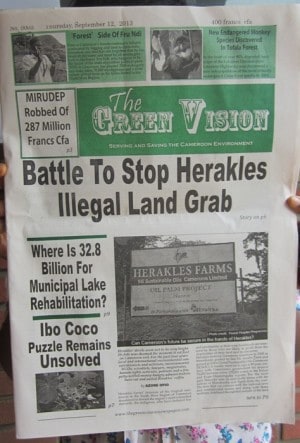
Battle to stop Herakles Illegal Land grap
In the September edition of The Green Vision Newspaper, the paper explores the land grab case of the controversial US firm, Herakles in Cameroon. In an extensive manner, The Green Vision explained that Herakles Farms’ invasion of the tropical rainforests in the South West Region of Cameroon threatened to thwart the region’s most committed stewards, the indigenes, who have endured fear and uncertainty as their very livelihoods are menaced by those who are likely to profit from the deprivation of their land and its resources. The Green Vision Newspaper explained that Herakles entered Cameroon sometime in 2009 guided by late Dr. Isiodre Timti and guised as Sithe Global Sustainable Oils Cameroon (SGSOC). It hastily went on to sign a 99-year contract with Cameroon’s government for around 70,000 hectares (over 170,000 acres) in the Ndian and Kupe-Muanenguba regions. The paper explained that for the most part, Herakles was on unfriendly terms with the natives of Mundemba and Nguti from the start. The firm had cut corners with the national laws and international norms and along with these mishaps, sidelined the rightful owners of the land it very much wanted to exploit.
Colocassia esculenta puzzle remains unsolved
The Green Vision Newspaper also reported about the disease that hit the staple food crop colocassia esculenta commonly known as ibo coco. According to this paper, it is close to four years since a yet to be known disease attacked the crop in the Southwest Region and the cause of the decline of the staple has remained elusive. So far, the emergence of this disease has sparked up controversies amongst farmers and researchers. There have been different interpretations as to the origin, the name and the cause of the disease. Many are those that have linked it to acid rain or a malediction. Some researchers have likened the disease to the taro leaf blight which hit other regions of Africa given the similarities in the symptoms. As farmers wait for a solution, the prices of Ibo coco substitutes like Makabo, plantains, sweet potatoes and yams are soaring. A bunch of plantain which used to cost 2,000 francs cfa is now sold at 4,000 francs cfa. The same goes for yams and Makabo. According to this paper, despite the intensity of the disease, the Research Institutes have not been up to any meaningful research to address the problem.
Where is the 32.8 Billion for Yaounde Municipal Lake Rehabilitation?
The Green Vision Newspaper also questioned about the fate of the multi-billion contract to rehabilitate the Yaoounde Municipal Lake. According to the paper, on February 7, 2013, 32.8 billion francs cfa was signed for the rehabilitation of the eight-metre deep Yaounde Municipal Lake. The Cameroon Minister of the Economy, Planning and Regional Development, Emmanuel Nganou Djoumessi, signed for Cameroon while Marcellino Cabanas Ansorena, Spanish Ambassador to Cameroon, signed for his country. Following the billion-franc convention, it was hoped that the lake, which had become a wet grave for faceless corpses and all sorts of garbage would regain its glitter. Six months after, the lake remains a quagmire in the middle of the capital city.
Burning Desire for Charcoal scorches Cameroon’ Forests
Cameroonians are burning increasing amounts of charcoal for cooking and heating, raising concerns among environmentalists about growing deforestation and carbon emissions in the country. According to The Green Vision Newspaper, the charcoal business is especially attractive to young unemployed people, and even older ones as the industry booms in Yaounde, the country’s capital. “When I found out there was increasing demand for charcoal, I had to change from my vegetable business,” said Evelyn Engonou, a trader in Yaounde. She made the switch four months ago, and now buys bags of charcoal from the East region which she supplies to Yaounde and Douala, Cameroon’s economic capital.The growing popularity of charcoal in Cameroon is an indication of a growing appetite for a power source more reliable than the country’s faltering gas and electricity supplies. Many businesses and households that formerly used gas or electricity have now switched over to using charcoal. Cameroon’s lone energy supply company, AES SONEL, and gas supply utility SCDP (Societe Camerounaise de Depot Petrolier) have not been able keep pace with the energy demands of a rapidly growing urban population.
Experts fear that if the energy crisis continues unabated it could contribute to growing deforestation that could worsen climate change and lead to more severe weather.
“Charcoal is obtained from the burning of trees, and if this trend continues you can imagine the quantity of trees the country is going to lose and what impact this will have for the future,” said Ebia Ndongo, Director in charge of Forestry in the Ministry of Forestry and Wildlife.
3000 households adopt environmental-friendly stoves to slow deforestation
Some 3000 households in the Southwest and the Littoral Regions are now cooking with environmental friendly stoves which minimize fuel wood use tremendously. According to The Green Vision Newspaper, the use of this stove called Envirofit has not only cut down expenses on wood but has equally reduced the rate at which people used to cut down trees in the Mt Cameroon forest in Buea, SW Cameron. “With just three pieces of wood, I can cook food for my entire family. I used to fetch firewood from a nearby forest, but I just realized since I started using this stove, I visit the forest less in search of wood” A Buea based Resident said. The stove is also known to reduce the amount of smoke emitted as compared to the traditional fireside.
Compiled by Regina F. Leke



